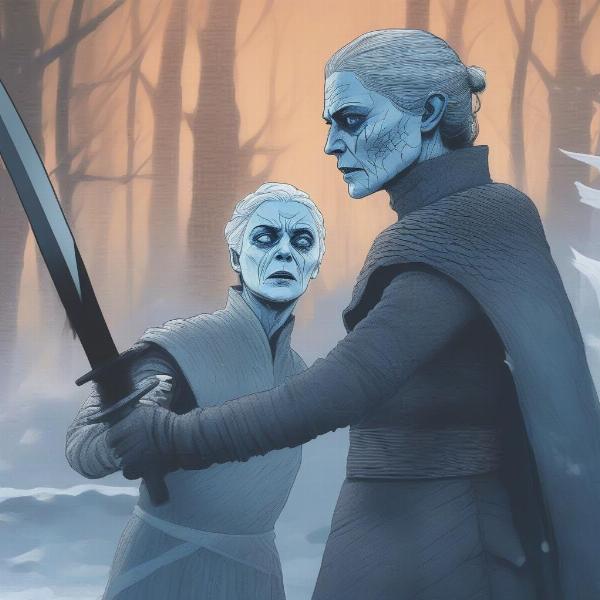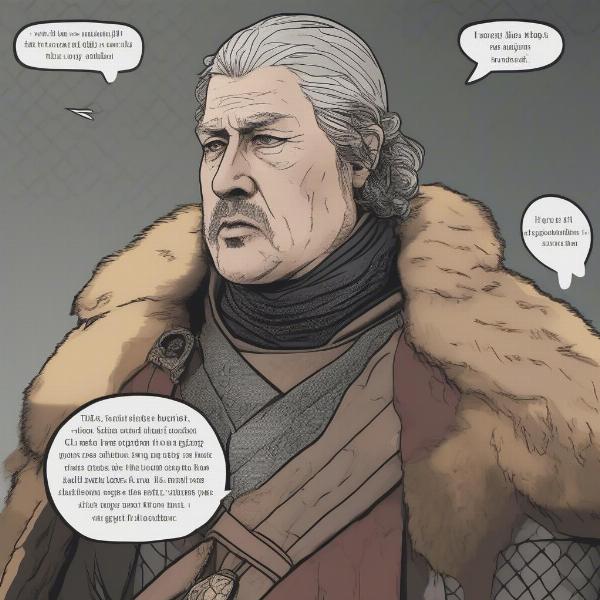Season 8 of Game of Thrones left a bitter taste in the mouths of many fans, marking a controversial end to a once-beloved series. From rushed storylines to character assassinations, the final season sparked widespread disappointment and debate about what went wrong. Let’s delve into the reasons behind the backlash and analyze the key factors that contributed to its downfall.
The Pace and Plot of Season 8
One of the most significant criticisms leveled against season 8 was its breakneck pacing. The season condensed complex plotlines and character arcs into a mere six episodes, leaving many viewers feeling cheated and unsatisfied. Major events that deserved careful exploration were rushed through, sacrificing narrative depth for spectacle. The rapid advancement of the plot often felt illogical and inconsistent with the established world and character motivations. This rushed pacing undermined the intricate tapestry of narratives that had been carefully woven over the previous seven seasons.
- Condensed Storylines: Key plot points, like Daenerys Targaryen’s descent into madness, felt unearned and abrupt. Her transformation, which should have been a gradual and tragic decline, was portrayed hastily, leaving viewers perplexed and unconvinced.
- Character Inconsistency: Beloved characters like Jaime Lannister seemed to regress in their development, making decisions that contradicted their established personalities and motivations. This perceived betrayal of character further fueled fan discontent.
- Lack of Narrative Depth: The shortened season left little room for nuanced storytelling and character exploration. Many storylines felt underdeveloped and resolved too quickly, leaving several loose ends and unanswered questions.
What could have been a complex exploration of power, morality, and fate, instead became a sprint to the finish line. This sacrificed nuanced storytelling for shock value. The result? A disjointed and ultimately unsatisfying narrative.
 Game of Thrones Season 8 Pacing Problems: Rushed Storylines and Character Arcs
Game of Thrones Season 8 Pacing Problems: Rushed Storylines and Character Arcs
The Night King’s Disappointing Demise
The Night King, built up as the ultimate antagonist for eight seasons, was defeated rather anticlimactically. His demise at the hands of Arya Stark, while visually stunning, felt narratively unearned. The long-awaited confrontation lacked the emotional weight and thematic resonance that many fans had anticipated. The Night King’s motivations remained largely unexplored, reducing him to a generic villain rather than the complex and terrifying threat he was initially portrayed to be.
- Lack of Motivation: The Night King’s backstory and motivations were never fully explained. This made his defeat feel hollow. Who was he? Why did he want to destroy the world? These questions remain largely unanswered.
- Anticlimactic Resolution: After seasons of build-up, the battle against the Night King felt rushed and underwhelming. The long night was unexpectedly short, and the resolution lacked the emotional impact it deserved.
- Underutilized Potential: The Night King represented a powerful symbolic antagonist, embodying death and destruction. His underdeveloped character arc squandered the opportunity for a more profound exploration of these themes.
The Night King’s unceremonious end was a major letdown for many fans. He became another victim of the season’s rushed pacing. This ultimately diminished the impact of the entire White Walker storyline.
 Night King vs. Arya Stark: A Disappointing Showdown
Night King vs. Arya Stark: A Disappointing Showdown
The Writing and Dialogue
The quality of writing and dialogue in season 8 also drew considerable criticism. Many fans felt that the dialogue became clunky and exposition-heavy, lacking the wit and nuance of earlier seasons. Character interactions often felt forced and unnatural, further contributing to the sense of disconnect between the characters and the audience. The overall decline in writing quality further undermined the emotional impact of the story’s conclusion.
- Expository Dialogue: Characters often stated the obvious, explaining plot points directly to the audience instead of showing them organically through actions and interactions. This made the dialogue feel unnatural and clunky.
- Loss of Nuance: The dialogue in earlier seasons was known for its subtlety and layered meaning. In season 8, much of that nuance was lost, replaced by simpler, more direct language. This contributed to a decline in the overall quality of writing.
- Character Inconsistencies: The dialogue often contradicted established character traits and motivations. Characters spoke and acted in ways that felt inconsistent with their past behavior, further eroding the audience’s connection to them.
The decline in the quality of writing and dialogue significantly impacted the viewing experience. It made the story feel less immersive and less emotionally resonant. Ultimately, it contributed to the overall dissatisfaction with the final season.
 Game of Thrones Season 8 Dialogue: Expository and Lacking Nuance
Game of Thrones Season 8 Dialogue: Expository and Lacking Nuance
Why Did It Happen?
Several factors contributed to the perceived decline in quality of season 8. The showrunners’ decision to deviate from the source material, coupled with the shortened season, arguably led to rushed storytelling and underdeveloped plotlines. The pressure to deliver a spectacular conclusion may have also contributed to the prioritization of spectacle over substance.
What Could Have Been Done Differently?
Many fans believe that extending the final season to allow for more thorough exploration of the plot and characters would have significantly improved the narrative. A more faithful adaptation of the source material, combined with a greater focus on character development, could have potentially delivered a more satisfying and thematically resonant conclusion.
Conclusion
Why Was Season 8 Of Game Of Thrones Bad? A combination of rushed pacing, underdeveloped plotlines, inconsistent characters, and a decline in writing quality ultimately led to its downfall. While the final season provided some visually stunning moments, it failed to live up to the narrative heights of its predecessors, leaving many fans disappointed with the conclusion to this epic saga. While the disappointment remains, the discussions and debates surrounding season 8 highlight the passionate engagement the show inspired and serve as a reminder of the power of storytelling and the importance of a satisfying narrative arc. Do you agree with this assessment? Share your thoughts in the comments below!

